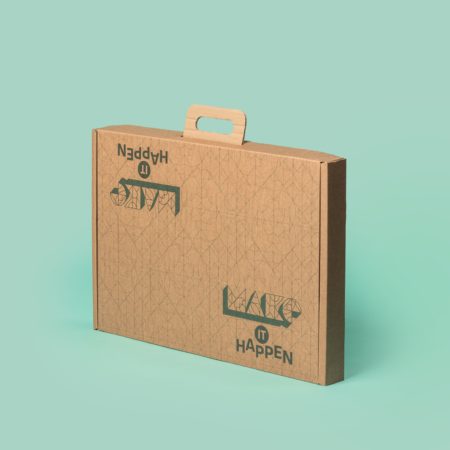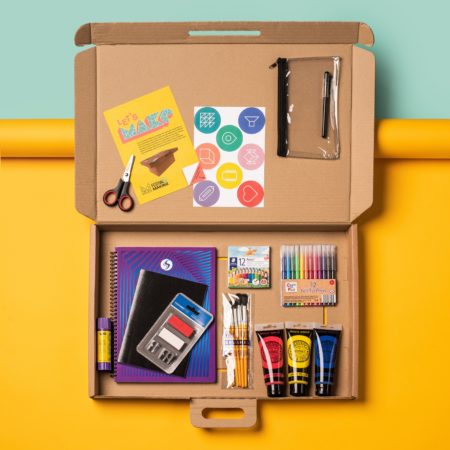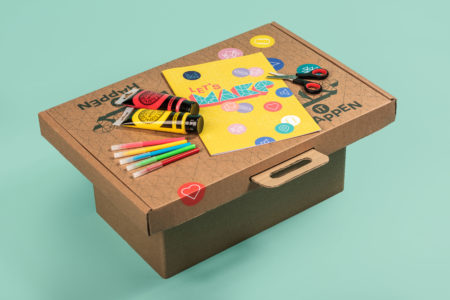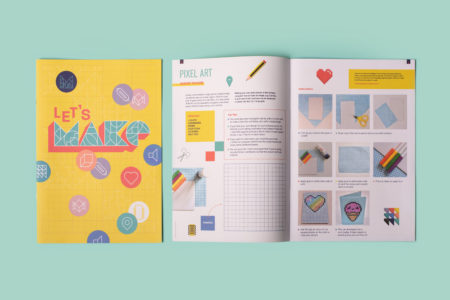

Each year at the Festival of Making we engage the local schools by facilitating visits and workshops and providing access to high quality making content. Due to the cancellation of the 2020 festival weekend, we’ve been working with The Creative Connection, Blackburn’s Local Cultural Education Partnership and their members Youth Action, Blackburn with Darwen Council, Blackburn Museum and Curious Minds to ensure we still managed to reach these groups, and hopefully played a part in inspiring the next generation of Makers.


We asked 5 artists, who we were looking forward to welcoming to the 2020 National Festival of Making as workshop facilitators, to develop making-led activities to engage 11-12 year olds who would be leaving Primary school and beginning their Secondary school journey. Along with our partners, we packed 600 boxes full to bursting with all the necessary making equipment for the activities as well as some useful stationary for the school transition.
Our boxes, packed with activities that are not only fun, but many of which also conform to the festival’s core aim of helping to develop interests in STEAM (science, technology, arts and maths), were produced by local manufacturers, the Cardboard Box Company, with an innovative, easy-build pattern showing children how to turn the box into a small making table.


The packs followed the Arts Council England Lets Create initiative which will see over 25,000 packs being distributed across the country through Arts Council England’s Bridge organisations and their local partners, such as museums, local authorities, schools, food banks and other charities.
Below you will find a digital copy of the activities in the pack, ready for download, as well as some information about the artists who contributed and a video tutorial for each activity.
Enjoy!
Jason is an artist and designer who reuses everyday objects to make unusual products and sculptures. The idea of using a J cloth to draw on came from his Everyday Objects project where he made something every day for a year.
www.rejason.com / instagram: @jasonmade
Emma is a Lancashire based artist with a studio at Prism Contemporary in Blackburn. Her practice is mostly printmaking, painting and wall pieces. She explores the use of colour, text and figurative compositions in her work to create self-expressive, abstract work.
www.emmacolbert.com / instagram: @emma_colbert
Sana is a Lancashire based artist with a studio at Prism Contemporary in Blackburn. Her practice is predominantly based on paintings. She explores the use of found objects and shapes in her work to create abstract artworks which transcends emotions far deeper than realistic figurative elements. Most of her artwork is based on life experiences and expressing herself through the complex language of colour and composition.
instagram: @sanamaulvi8
Supermarché are design duo, Charlie & Ben, who live in Sheffield via Lancaster. They specialise in public facing graphic design, murals and workshops. From their 3rd floor studio they work in a huge range of mediums, from ceramics to screen printing to web design and film, always with an emphasis on utilitarian design that brightens the neighbourhood.
instagram: @supermarche_shop
Gemma is a participatory artist/maker based in Cheshire. Her work combines analogue and digital processes, taking inspiration from craft heritage. Embracing accessible materials and methods she engages a wide range of people and makes otherwise intimidating processes accessible to all.
This activity is based on a process carried out during a collaboration I did with fellow artist Alec Stevens in 2014, called Bilocular in which we generated patterns to form the basis of 3D sculptures.
Some quotes from pupils and teachers who received the activity boxes distributed through our charity partners:
Look at all this cool stuff”
Tiny pencil crayons, I’ve never seen these before!”
Miss, is it mine to colour in and keep? Sooo smart”
On receipt of the stationary packs, the students were alight with anticipation and curiosity. The box enables the students to reach their creative potential and allows them to be self-sufficient in the learning needs. The creative stationary box allows students to have the access to different materials and resources whilst giving them a personal belonging and area where and with which they can work, be self-motivated and be proud of their outcomes for learning and creativity.”
The pupils have loved exploring their stationary boxes, during progress time. It has meant they all have access to amazing equipment. They couldn’t believe it was free, and that they could keep it. A lot of them are looking forward to taking them home and creating their own workspaces from them.”
Photography by Robin Zahler.